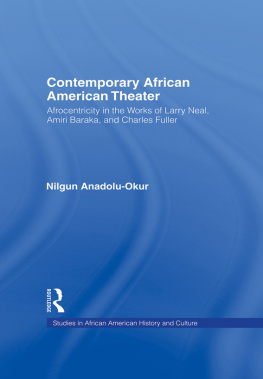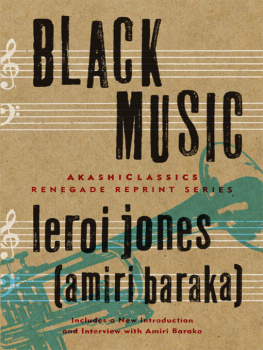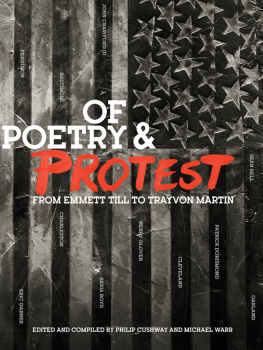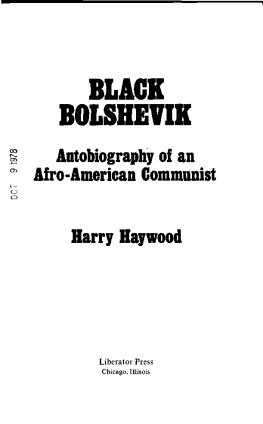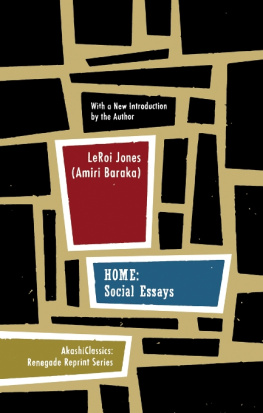Baraka Imamu Amiri - Amiri Baraka & Edward Dorn: the collected letters
Here you can read online Baraka Imamu Amiri - Amiri Baraka & Edward Dorn: the collected letters full text of the book (entire story) in english for free. Download pdf and epub, get meaning, cover and reviews about this ebook. City: Albuquerque (N.Mex, year: 2014;2013, publisher: University of New Mexico Press, genre: Art. Description of the work, (preface) as well as reviews are available. Best literature library LitArk.com created for fans of good reading and offers a wide selection of genres:
Romance novel
Science fiction
Adventure
Detective
Science
History
Home and family
Prose
Art
Politics
Computer
Non-fiction
Religion
Business
Children
Humor
Choose a favorite category and find really read worthwhile books. Enjoy immersion in the world of imagination, feel the emotions of the characters or learn something new for yourself, make an fascinating discovery.

- Book:Amiri Baraka & Edward Dorn: the collected letters
- Author:
- Publisher:University of New Mexico Press
- Genre:
- Year:2014;2013
- City:Albuquerque (N.Mex
- Rating:3 / 5
- Favourites:Add to favourites
- Your mark:
- 60
- 1
- 2
- 3
- 4
- 5
Amiri Baraka & Edward Dorn: the collected letters: summary, description and annotation
We offer to read an annotation, description, summary or preface (depends on what the author of the book "Amiri Baraka & Edward Dorn: the collected letters" wrote himself). If you haven't found the necessary information about the book — write in the comments, we will try to find it.
Amiri Baraka & Edward Dorn: the collected letters — read online for free the complete book (whole text) full work
Below is the text of the book, divided by pages. System saving the place of the last page read, allows you to conveniently read the book "Amiri Baraka & Edward Dorn: the collected letters" online for free, without having to search again every time where you left off. Put a bookmark, and you can go to the page where you finished reading at any time.
Font size:
Interval:
Bookmark:
Amiri Baraka & Edward Dorn

RECENCIES Research and Recovery in Twentieth-Cecntury American Poetics
MATTHEW HOFER, Series Editor
This series stands at the intersection of critical investigation, historical documentation, and the preservation of cultural heritage. It exists to illuminate the innovative poetics achievements of the recent past.
Other titles in the Recencies series available from the University of New Mexico Press: The Shoshoneans: The People of the Basin-Plateau by Edward Dorn and Leroy Lucus


Edited by
Claudia Moreno Pisano

2013 by the University of New Mexico Press
All rights reserved. Published 2013
Printed in the United States of America
18 17 16 15 14 13 1 2 3 4 5 6
The Library of Congress has cataloged the printed edition as follows:
Amiri Baraka and Edward Dorn : the collected letters / edited by Claudia Moreno Pisano.
pages cm. (Recencies: Research and Recovery in Twentieth-Century American Poetics)
Includes bibliographical references and index.
ISBN 978-0-8263-5391-7 (cloth : alk. paper) ISBN 978-0-8263-5392-4 (electronic) 1. Baraka, Amiri, 1934 Correspondence. 2. Dorn, EdwardCorrespondence. I. Moreno Pisano, Claudia, editor of compilation.
PS3552.A583Z48 2014
811.54dc23
[B]
2013015141
For my family
ContentsForewordFrom the Archive OutThe inauguration of Recencies is a most welcome addition to the field of possibilities in contemporary literary studies and yet another indication that new pressures are being brought to bear on our conceptions of recent cultural history. By creating a space for older work to be seen anew, the series further formalizes an important shift in recent scholarship. The early idea for Claudia Moreno Pisanos extraordinary project to collect the letters written between poets Edward Dorn and LeRoi Jones/Amiri Baraka came at the very beginnings of what would become Lost & Found: The CUNY Poetics Document Initiative, an innovative pedagogical/publishing venture founded in 2009 under the auspices of the Center for the Humanities at the Graduate Center of the City University of New York. With an emphasis on extra-poetic work by poetsfurther conceptualized as representing the actual thought and research of writers in face of the academic, ideological, and political straight-jackets of the Cold WarMoreno Pisanos choice to focus on these letters, and through them the friendship of two major figures of late twentieth-century North American culture, has proven revelatory in ways we can only begin to enumerate.
I say only begin because many more such projects await, in the form of research and scholarship, that will fully establish the enormous scope, and the often heroic character, of writers associated with what came to be called the New American Poetry or, perhaps more accurately, unofficial verse culture. The recent but significant turn away from literary theory and toward textual scholarship focusing on the immediate past is the first stage in making available what Ed Dorn would call the data and establishing the very terrain upon which we might more soberly account for the explosion of the kind of radical poetic, formal, artistic, and intellectual creativity and restlessness that the work of Baraka and Dorn represents. Moreno Pisanos work, then, is a model of such data collectionand one worth emulating.
By taking past innovation in textual organization and commentary (I think of Ralph Mauds work on The Selected Letters of Charles Olson but many others as well) and adding a dense but seamless layer of social and political commentary in her enormously useful headnote sections, Moreno Pisano manages to embed her stance toward the material in a running narrative that contextualizes the work for both then and now. Because she has also taken into account the further trajectories of Baraka and Dorn, beyond the dates of these letters, we are given great insight into some of their later practices. In her opening commentary on letters from 19591960, for example, Moreno Pisano refers to a 1972 interview conducted with Dorn in which he speaks of the importance, for a writer, of getting assignments. Given that, at this point, neither Baraka nor Dorn have an audience to speak of, she proposes the letters themselves to serve as this kind of assignment, as Dorn and Jones are proving themselves to one another, testing the limits of their poetry and ideas, and doing so against worthy partners.
The extent to which so many major ideas and forms of the time were explored in letters cannot be overstated and constitutes a primary site for the exploration of the curious inversion of the public and the private during the Cold War, reaching, perhaps, an apotheosis in the surveilled letters written by imprisoned activist George Jackson. When Dorn characterized the United States in the early 1960s as a permissive asylum, his prescience met head on with Barakas experience, the kind of experience limned in one of his earliest texts, Suppose Sorrow Was a Time Machine, in which the story of his grandfathers forced migration due to racism is told through an enlightenment that can only become obscure, through the vibrations of time travel in which, as in Barakas masterpiece Blues People, emotional validity is what everything must be tested against.
We are only beginning to come to grips with the still ongoing legacies of the Cold War and the National Security State, particularly as it has affected not just the horizons of our political life but designs of and on the imagination itself. In one ripple effect, the 9/11 Commission Report concludes that we believe the 9/11 attacks revealed four kinds of failures: in imagination, policy, capabilities, and management. Section 11.1 of the Commissions chapter on imagination states the following: Considering what was not done suggests possible ways to institutionalize imagination.... It is therefore crucial to find a way of routinizing, even bureaucratizing, the exercise of the imagination. Against the expected Orwellian scenarios often presented by liberal thought, it might make more sense not to divorce something like the 9/11 Commission Report from the general culture, to see it as following and not leading, as confirming what has already taken place.
In this sense, making available this kind of primary material gives us a conduit to begin deinstitutionalizing our imaginations, to return to possibilities both thwarted and realized but certainly imagined. One of the prime pedagogical principles in the Lost & Found project is to put aside labels of schools and movements and conventional literary histories, such as exist of the period, and follow the person. By following Amiri Baraka and Ed Dorn, guided by Moreno Pisanos sure hand, we are presented with an alternative universe tracing the formation of 1960s North American thought and culture in ways almost impossible to find elsewhere. Naturally, primary materials are messier than codified studies, but they open worlds usually foreclosed by decorum, disciplinary stricture, dictates of fashion or relative worth, and a host of other containment methods.
Next pageFont size:
Interval:
Bookmark:
Similar books «Amiri Baraka & Edward Dorn: the collected letters»
Look at similar books to Amiri Baraka & Edward Dorn: the collected letters. We have selected literature similar in name and meaning in the hope of providing readers with more options to find new, interesting, not yet read works.
Discussion, reviews of the book Amiri Baraka & Edward Dorn: the collected letters and just readers' own opinions. Leave your comments, write what you think about the work, its meaning or the main characters. Specify what exactly you liked and what you didn't like, and why you think so.

